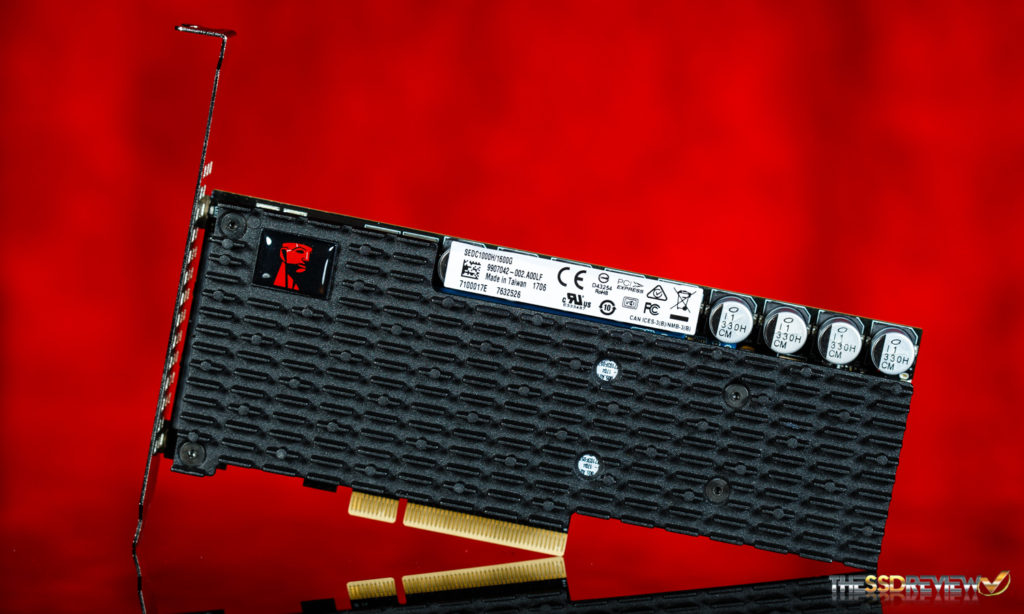Considering that data center SSDs affect so much of what we do everyday in today’s world, their technological marvel is really overlooked. Where the hard drive once filled our largest data centers worldwide, today’s data centers contain SSDs that either complement original HDD implementation, or take the place of hard drives completely. What they do, and really what flash technology does as a whole, might perhaps be the most important advance of our century, yet so few really know or understand it. We have become a society of instant access to just about everything, and SSDs such as this Kingston DCP1000 are entirely responsible for such.
Our report today examines the Kingston DCP1000 Data Center NVMe enterprise SSD, our specific sample being a 1.6TB capacity. Kingston’ vision of this SSD reflects all of what we have seen in data centers in the last ten years, in that, the faster the throughput, higher the IOPS and lower the latency that SSDs provide, the more efficient we become and the faster we have information at hand. As much as we may overlook this advance, it affects everything we do in some way, shape or form. To the laymen, the best example is simply getting an instant response when doing a Google search on their smartphone, when in reality, the data center SSD plays a part in aeronautics, medical, weather, transportation, media, communications, and affects each and every one of us in some form…every day.
Considering all that may be said of our advance into the information age, the Kingston DCP1000 is rather special. In some forms, it just may be labeled ‘King of the Hill’ at least for now, simply because it’s is one of the fastest enterprise SSDs of its kind in the world, capable of data transfer speeds of 7GB/s and over a million IOPS…in a single storage device.
SPECIFICATIONS AND AVAILABILITY
The Kingston DCP1000 is a data center SSD that is available as an HHHL (half-height half-length) add-in card and capacities of 800GB, 1.6TB, and 3.2TB. It is an NVMe SSD that utilizes PCIe Gen 3 x8 lanes and is very much a plug and play device that has a flexible drive topology, in that, it is initially recognized as four logical drives that can be configured to the user’s needs. Warranty support is 5 years limited and the DCP1000 has an MTBF of 2 million hours. Power consumption is rated at 35W active and it is compatible with Win 8.1/10/Server 2008 R2 (with updates)/2012 R2, Linux kernel 3.3 and higher, FreeBSD 10x/11 and VMware vSphere 6.0.
Performance specifications detail sequential throughput at 6.8GB/s read and 5GB/s write for the 800GB capacity and 6.8GB/s read and 6GB/s write for both 1.6TB and 3.2TB capacities. Steady state random 4K read and write is listed as 900K/145K IOPs for the 800GB, 1,100K/200K IOPS for the 1.6TB and 1,oooK/180K IOPS for the 3.2TB capacity. Typical read/write latency is rated at 100us/30us read/write. Finally, endurance is listed as 748TBW (800GB), 1500TBW (1.6TB) and 2788TBW (3.2TB).
KINGSTON DCP1000 DISASSEMBLY
When we disassemble the Kingston DCP1000 NVMe enterprise SSD, we can see that it consists of four Kingston 400GB NVMe M.2 SSDs that feed into a PLX PEX8725 24-lane, 10-port PCIe 3.0 switch to the cards PCIe 3.0 x8 connector.
The PLX switch is identifiable in the first photograph as it has its own black heat sink on it, and below with its branding. In addition, there are 9 power capacitors visible on the top of the DCP1000 that provide for hardware-based data loss protection should a power failure occur.
The DCP1000 is plug and play and initially identified as four logical drives that can be set into any number of configurations, including, but not limited to RAID.
Each of the four M.2 SSDs on the DCP1000 is powered by the PhisonPS5007-11 eight channel quad-core controller and each SSD also contains eight modules of Toshiba 15nm MLC NAND flash memory (TH58TF69DFLBA8C) along with a Kingston branded DRAM cache chip.
Kingston has even listed endurance values for the individual M.2 SSDs should the end user elect to use the DCP1000 in a configuration outside of a single RAID volume, these being 187TBW (200GB), 375TBW (400GB) and 697TBW (800GB).
 The SSD Review The Worlds Dedicated SSD Education and Review Resource |
The SSD Review The Worlds Dedicated SSD Education and Review Resource | 

wow this one is a true beast
What raid level did you use for the four logical drives ?
RAID 0. Stay tuned as we are doing same to two of these drives soon.